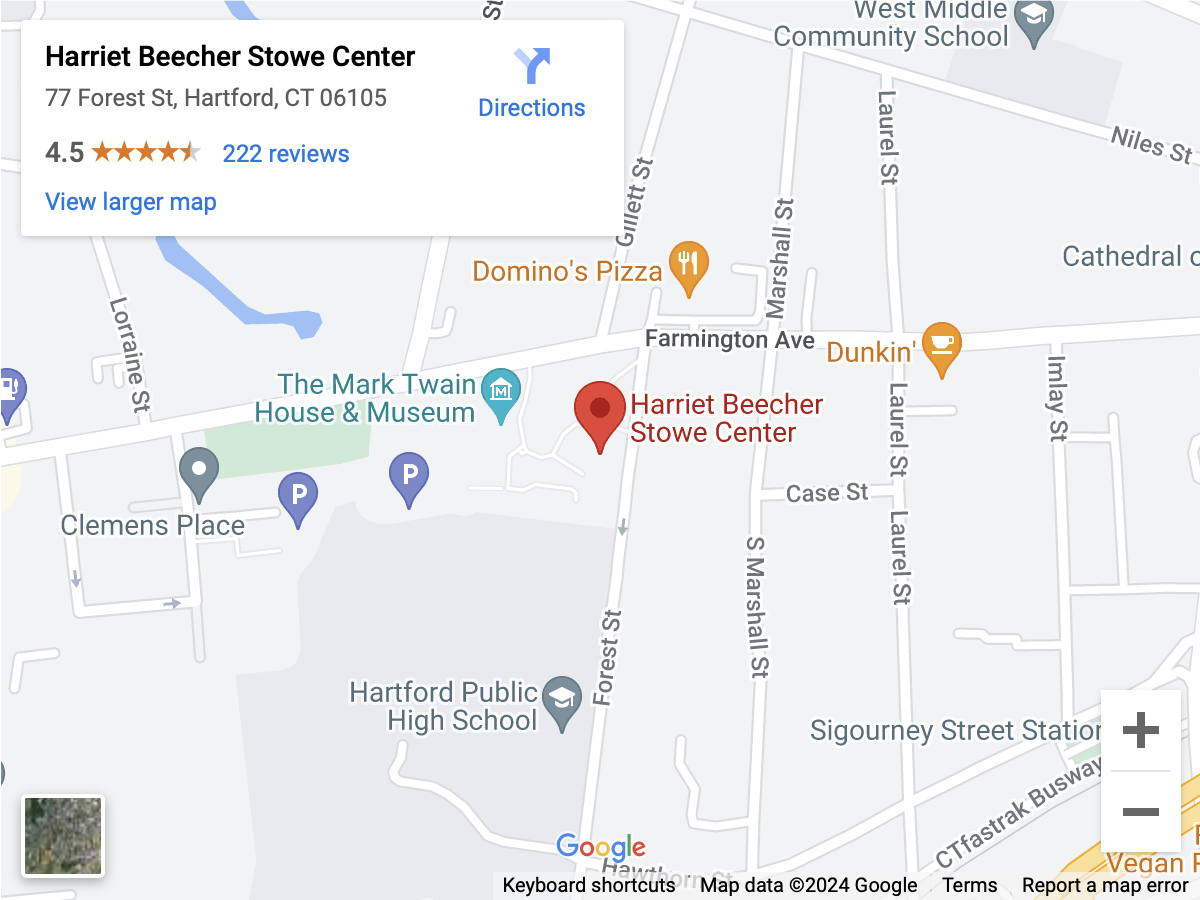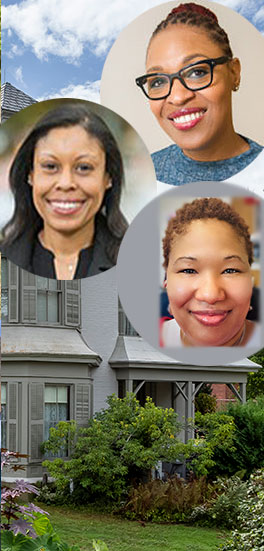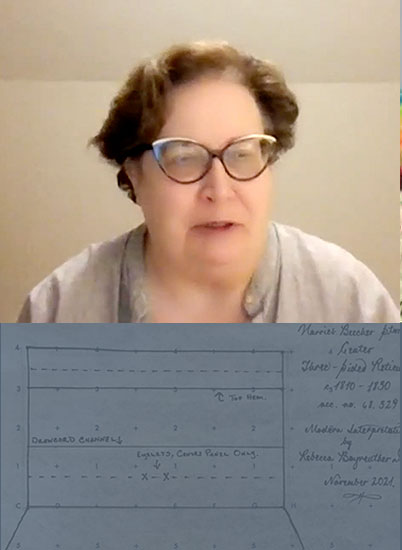Stowe Center for Literary Activism
77 Forest Street
Hartford, CT 06105
860-522-9258
info@stowecenter.org
Stowe Center for Literary Activism
77 Forest Street
Hartford, CT 06105
860-522-9258
info@stowecenter.org
How should historians interpret apparent LGBTQIA+ historical relationships involving people who did not self-identify? How can museums design responsible guidelines for historical storytelling that encompass the complexity of suppressed and hidden histories—as well as the wishes of the subjects? Hear four case studies of historic sites in New England doing this work in a variety of geographic places, in different timelines, and at different points in their institutional research and interpretation.
Through these four 20th-century case studies, scholars and educators explore these questions in the lives of four individuals, including Katharine S. Day, the founding preservationist of the Harriet Beecher Stowe Center and the great-niece of Harriet Beecher Stowe.
This program was made possible in part by CT Humanities, and by the generosity of Anne Stanback and Charlotte Kinlock.
Image: Photograph of Katharine Seymour Day in the Stowe House backyard, c. 1925. Harriet Beecher Stowe Center, Hartford, CT.
Click on the thumbnail image of the program below to access more information
Explore how and why sentimental sewing—or adding a moral message—was used by Harriet Beecher Stowe, abolitionists, and activists historically as a way of speaking out at a time when their voices were often excluded from public forums.
Our Sewing and Learning Workshop includes discussion of the ethics of craft materials, a step-by-step craft instruction, research on the histories embedded in the abolitionist political stitch, and inspirational work from contemporary craft-activist, or “craftivist,” artists.
Kits are available for purchase through our online Museum Store.
Click on the thumbnail image of the program below to access more information
The 2022 Stowe Prize was awarded to Dr. Clint Smith on June 2, 2022 for his New York Times bestselling book, How the Word Is Passed: A Reckoning with the History of Slavery Across America (Little, Brown and Company, 2021).
Click on the thumbnail image of the program below to access more information
Our 2022 Salon series, Teaching Race History and Reading Banned Books: Conversations on Intellectual Freedom, are evocative discussions from a range of viewpoints about the right of intellectual freedom, the question of whose words and voices are included in public education, and how, when, and by whom such determinations are made. Each Salon features guest speakers with diverse expertise in education, censorship, access, and civil liberties.
Salons at Stowe are 21st-century parlor conversations about contemporary social justice issues. Since 2008, Salons have provided a forum for lively discussion on topics rooted in the 19th century that remain pressing today.
Click on the thumbnail image of the program below to access more information
In 2020 and 2021, the Stowe Center commissioned two original works of art, one by multidisciplinary artist jackie sumell, director of Solitary Gardens, in honor of 2020 Stowe Prize winner Albert Woodfox, and the second by Judy Dworin of the Justice Dance Performance Project. These projects were designed to use creative expression to explore historical themes and social justice issues today. Both sumell’s Solitary Garden installation and Dworin’s collaborative dance and spoken-word performance, Emergence, address issues relating to incarceration and bridge community-based action with each artist’s creative impulse and practice, as discussed in the accompanying Salon.
Click on the thumbnail image of the program below to access more information
Employed to compensate for restrictive fashions and to address a range of social and cultural needs, pockets and small bags are a microcosm of complex political, gender, and race history.
In our Sewing and Learning Workshop, participants can learn to sew and decorate a replica of a reticule, a kind of pocket purse, while immersing in the fascinating history of these small but significant objects.
Click on the thumbnail image of the program below to access more information
Watch the Stowe Prize livestream with Dr. Eddie Glaude Jr, author of Begin Again: James Baldwin’s America and its Urgent Lessons for Our Own, in conversation with Stowe Center Board member and UConn professor Dr. Jeffrey O.G. Ogbar and Beth Burgess, Director of Collections at HBSC. This incredible discussion dives into the Stowe Center collections to spark conversation about Stowe herself, James Baldwin, Begin Again, and the history of race in the United States. The 2021 Stowe Prize, and this conversation, embodies the Stowe Center’s ongoing work to preserve our historic collections, promote vibrant discussion of Stowe’s life and work, and inspire commitment to inspiring positive change and social justice.
Click on the thumbnail image of the program below to access more information
Dr. Eddie S. Glaude Jr. has been awarded the 2021 Stowe Prize. To celebrate the work of Dr. Glaude, and his book “Begin Again: James Baldwin’s America and Its Urgent Lessons for our Own,” we have a suite of programs that explore Glaude’s work, James Baldwin, and Harriet Beecher Stowe as they connect with historic and current social justice issues.
The first two programs in this audio series are generously supported by CT Humanities, an organization deeply committed to promoting programs that encourage curiosity, understanding and critical thinking. With grant support from Connecticut Humanities, we invited two scholars to be in conversation with Dr. Glaude. The second conversation is followed by a music soundscape that you can access by returning to the main 2021 Stowe Prize triptych page. Qiana ‘DJ Q-Boogie’ Coachman-Strickland is a Greater Hartford-based Sound Artist and the curator of the playlist for Stowe Prize Soundscape: An Art Project. The Stowe Prize Soundscape is generously supported by Travelers.



For more information about Dr. Glaude
For more information about the Stowe Prize
For more information about Dr. Selders
For More information about Dr. Griffin
For more information about DJ Q Boogie
For the full list of Soundscape source material
Click on the thumbnail image of the program below to access more information
A part of the Telling Our Nation’s Story initiative, the Stowe Center’s 2021 Salon series aims to engage communities throughout the country in direct, open-ended, and inclusive conversations about the complex and always evolving American story, and to face the narratives that divide us in pursuit of the values that unite us.
The Harriet Beecher Stowe Center presents these salons in collaboration with Our Common Purpose: Reinventing American Democracy for the 21st Century and the Commission on The Practice Of Democratic Citizenship, A Project Of The American Academy of Arts & Sciences. Jonathan Cohen joins to introduce Our Common Purpose, the final report of the Academy’s Commission.
Salon #1 Discussion with Cheryl Thompson author of Uncle: Race, Nostalgia, and the Politics of Loyalty (2020) & Maisa Tisdale who is on the ground working to expand the narratives of Black experience and perception through Mary & Eliza Freeman Center for History and Community in Bridgeport, CT’s South End.
Salon #2 Discussion with Jonathan Daniel Wells author of The Kidnapping Club: Wall Street, Slavery, and Resistance on the Eve of the Civil War (2021) and Daryl McGraw the co-chair of CT state Police Transparency and Accountability task force and founder of Formerly Inc, a criminal justice consulting company along with Martha McCoy, Executive Director of Everyday Democracy.
Salon #3: Discussion with Dr. Anna Malaika Tubbs, author of The Three Mothers, and Janée Woods Weber, Executive Director of Connecticut Women’s Education and Legal Fund (CWEALF). Dr. Tubbs’s extensive research on activist mothers from the civil rights movement and beyond adds scope and dimension to CWEALF’s longstanding advocacy for women’s rights and opportunities in Connecticut. A relaxed format conversation centered on the empowerment of women and girls, especially those who are underserved or marginalized, and speculates on what would happen if the nation’s policies supported the social and cultural vision shared by so many Black women.
Click on the thumbnail image of the program below to access more information
This quadriptych celebrates the 2020 Suffrage Centennial from the lens of a Stowe Center suffrage collection item layered with making and learning. Viewers can learn how to make a replica of Isabella Beecher Hooker‘s American suffrage Phrygian-style hat, a treasured object from the Stowe Center’s collections by downloading the instructions and pattern. Online participants will need to assemble the supplies needed to complete this DYI project from home. Also included in this triptych is a “how to” instructional video by Rebecca Bayreuther Donohue, Stitcher and Pattern Maker, whose video provides an overview lesson to help you make your hat. The fourth item in the quadriptych is a talk by Dr. Shirley Wajda, Ph.D. in American Civilization, about nineteenth-century American sewing circles and the importance of the suffrage cap as well as topics related to women’s suffrage history, anti-slavery activism, and the history of voting in America. Activate this online learning at home alone, with some friends in your Pandemic pod, or create your own virtual sewing project circle. Print on 11” x 17” inch paper or tile the pattern printouts.
Click on the thumbnail image of the program below to access more information
Solitary VR is a multi-media, sensory, digital work of art designed by Mackenzie Fox (UCONN Digital Humanities Lab) to “bring Woodfox’s words off the page” and give audiences a look into Albert Woodfox’s book Solitary (Stowe Prize Winner 2020).
Gender discrimination and racial inequality are an immense part of our national history. In this series, the Stowe Center team explores suffrage history as we celebrate the Women’s Vote Centennial Initiative.
Click on the thumbnail image of the program below to access more information
The Harriet Beecher Stowe Center is proud to honor Albert Woodfox, known as one of the Angola Three, as the 2020 Stowe Prize winner. Woodfox receives the award for Solitary, his memoir about the four decades he spent in solitary confinement for a crime he did not commit.
Click on the thumbnail image of the program below to access more information
Made up of three conversations that took place in the wake of the murder of George Floyd in May of 2020, each podcast has a panel of exceptional Hartford region activists, scholars, cultural workers, and policy makers in conversation about the cultural uprisings and racial brutalities witnessed in this needless murder. These panels are all moderated by Joelle A. Murchison and raise a number of important issues and feelings relating to racial injustices now. All Unspoken Truths programs and documentations are presented in collaboration with the Charter Oak Cultural Center, The Amsitad Center for Arts & Culture, B’nai Tikvoh-Sholom, CT Mirror, Exec Mommy Group, Harriet Beecher Stowe Center, HartBeat Ensemble, The Mark Twain House & Museum, Neshama Center for Lifelong Learning, Dodd Human Rights Impact at the University of Connecticut, UCONN Hartford, United States of Women, and YWCA Hartford Region.
Click on the thumbnail image of the program below to access more information
Racism and racial inequality are an immense part of our national history. In this series, The Stowe Center team shows how this history unfurls in the lives of one family as they navigate the political, social, and moral landscape during the Civil War and after. To that one family, we layer a state and the ways in which racial profiling continues the legacy of historic racism. To the state, we explore a national issue that links slavery, profiling, and incarceration to the issues of public health and racial inequality during the COVID-19 Pandemic of 2020.
Click on the thumbnail image of the program below to access more information
Click on any thumbnail for more information
 Thank you for your generous gift! A welcome letter and your membership card(s) will be mailed to you shortly.
Thank you for your generous gift! A welcome letter and your membership card(s) will be mailed to you shortly.
Sincerely,
Casey Grambo
Director of Development
Thank you so much for your interest in a group tour at the Harriet Beecher Stowe Center! Please help us schedule your visit by answering the questions below.
Thank you so much for your interest in a group tour at the Harriet Beecher Stowe Center! Please help us schedule your visit by answering the questions below.
Isabella Holmes Beecher Hooker (1822-1907)
An ardent member of the woman’s suffrage movement, Isabella Holmes Beecher Hooker joined in the cause along with Elizabeth Cady Stanton and Susan B. Anthony.

Isabella was the first child of Lyman Beecher and his second wife, Harriet Porter Beecher.
Isabella began her education at Catharine Beecher’s Hartford Female Seminary and lived with her sister Mary Perkins. In 1841 she married John Hooker, a descendant of Thomas Hooker, the founder of Hartford. John Hooker was a lawyer and an abolitionist.
In the early 1860s Isabella got involved in the woman’s suffrage movement. Isabella joined Elizabeth Cady Stanton and Susan B. Anthony as a member of the National Woman’s Suffrage Association in 1869. She was a founding member of the Connecticut Woman’s Suffrage Association. Isabella’s ideas of equality were influenced by John Stuart Mills’ On Liberty and the Subjection of Women.
In 1871, Isabella organized the annual convention of the National Woman’s Suffrage Association in Washington D.C. and presented her argument before the Committee on the Judiciary of the United States Senate. Her husband, John Hooker, believed in his wife and supported her activities. He helped Isabella draft a bill to the Connecticut Legislature giving married women the same property rights as their husbands. The bill passed in 1877. Isabella annually submitted a bill granting women the right to vote, but it did not pass in her lifetime.
Due to inclement weather, the Harriet Beecher Stowe Center is closed today, Monday, December 2.















































